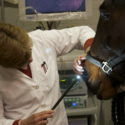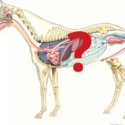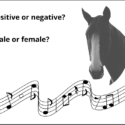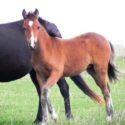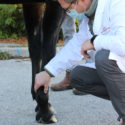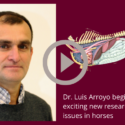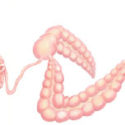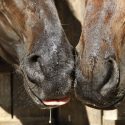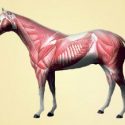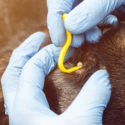Research
Stem Cells Under Investigation as a Possible Future Treatment for Equine Asthma
Heaves is known as a disease that can leave a horse struggling to breathe, ending athletic careers and even rendering a pleasure horse unsuitable for riding. Commonly known today as equine asthma, it’s an irreversible disease brought on by repeated exposure to dust and moulds. Ontario Veterinary College researcher, Doctor Bienzle has a long history…
The Impact of Antibiotics on the Equine Gut
The thinking on how we use antibiotics is changing in the world of medicine especially as we learn more about their impact on the inhabitants of the gut. Ontario Veterinary College researcher, Dr. Diego Gomez, took part in a collaborative study with researchers across North America to study the effects of intravenous antimicrobials on the…
What is in a Whinny?
When horses talk, we listen but how good are we at deciphering what they have to say? According to a recently published study (Nov 2021) by Dr. Katrina Merkies, researcher and associate professor at the University of Guelph, and her master student Haley Belliveau, we are faring well. Using an online survey, participants categorized 32…
Research into Development of the Foal’s Gut Could Advance Treatment of Critical Cases of Diarrhea
The foal’s gut undergoes many changes as it develops rapidly. More and more, we are learning how the colonization of a gut correlates to good health. Exploring the differences in foal microbiomes and how those differences may tie in with overall health has PhD Candidate, Jennifer MacNicol, very excited about the potential advancements the research…
Research on Equine Pregnancy
The value of long-term studies is well understood by researcher, Dr. Keith Betteridge who has been involved with Ontario Veterinary College equine reproduction studies since 1986. Since graduating as a veterinarian from Bristol University, England, in 1959, Betteridge has seen reproduction technology evolve with the introduction of ultrasound in the 1980s and, most recently, RNA…
Encapsulating Stem Cells for Treating Equines with Osteoarthritis
The next exciting step in regenerative therapies has Dr. Thomas Koch, Ontario Veterinary College, and his team encapsulating stem cells to see if they can enhance the effect of treatment. Horses with osteoarthritis in their joints stand to benefit from a therapy with a slower release time. “When you encapsulate the cells within hydrogel, you…
New Equine Fecal Transplant Research
By Jackie Bellamy-Zions for the Equine Guelph Annual Research Update – Volume 19 Fecal transplantation has been very successful in treating humans with issues such as C-difficile infection, which is also a leading cause of diarrhea in horses. Ontario Veterinary College researcher, Dr. Luis Arroyo and his team are about to begin a study which…
Equine Supplement Research Explores Potential Gastric Health Benefits
Collaborating on three recent research papers on a nutraceutical called ‘Gs Formula’, Dr. Wendy Pearson, PhD Associate Professor, at the University of Guelph has been very busy. Approached by GS Organic solutions out in BC, Pearson has been investigating the potential for Gs Formula to improve gastric health, particularly for horses with a history of…
EHV-1 Research Study and Infection Control Tips
“Most horses have been exposed to the equine herpies virus,” says Dr. Diego Gomez-Nieto, researcher at the Ontario Veterinary College. Gomez has been part of a research study on the Equine Herpes Virus which discovered the nasal microbiota of infected horses differed significantly to those of a healthy control group. The study came together quickly…
Are most horses lefties?
The perils of putting symmetrical saddles on asymmetrical horses “We were not surprised to learn 60% of the horses in our 490 horse retrospective study had larger measurements on the left side of their withers,” says Dr. Katrina Merkies, researcher and associate professor at the University of Guelph. Undergraduate students, Julia Alebrand, Bethany Harwood, Katharine…
What to do About Ticks
Both people and their animals have been encountering more ticks and there is a real concern when it comes to the possibilities of contracting Lyme disease. Dr. Luis Arroyo, researcher at the Ontario Veterinary College was involved in a study on the growing numbers of ticks in southeastern Canada and the risk factors to horses. …
Equine Robo-Gut Helps OVC Researchers Study Gastrointestinal Diseases In Horses
Originally published by Ontario Veterinary College – June 14, 2021 A University of Guelph researcher is advancing knowledge into prevention and early detection of gastrointestinal diseases in horses using a mechanical replica of a horse’s GI system to mimic equine digestion and disease. Dr. Luis Arroyo, professor in the Department of Clinical Studies at the…


